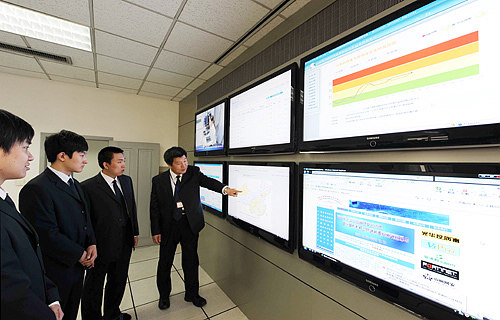 |
|
CONFRONTING VIRTUAL THREATS: Engineers at the National Computer Virus Emergency Response Center of China analyze the country's cyber security conditions (LIU HAIFENG) |
Making rules for cyberspace inevitably concerns the basic principles and core interests of all countries. Despite growing consensus, differences and disputes remain. Hague confessed at the London conference that reaching common understanding is a huge challenge.
Countries have quite different opinions about cyberspace rules. Some insist on following current international laws and regulations, such as the UN Charter, the law of war and the EU Convention on Cybercrime. Some believe no existing rules are suitable for cyberspace, and others suggest amending current laws and regulations to fit technological and social development.
When it comes to rule-making in cyberspace, it is hard to strike a balance between development and security, between openness and supervision, and between freedom and security. Governments are obligated to supervise cyberspace while refraining from hindering technological advances and infringing upon citizen rights. "Our task today and in the future is to strike a balance," Cameron said at the London conference.
Participants, however, disputed the role the government should play. Some expressed the view that the government should not take over overall management of cyberspace under the pretext of fighting cybercrimes or maintaining cyber security. The disputes come down to whether sovereignty in cyberspace should be recognized and if it is legal for the government to exercise jurisdiction over acts in cyberspace.
Countries care about who is the rule-maker of cyberspace. Many years ago, the UN issued several documents on protecting cyber security and combating cybercrimes. The International Telecommunication Union, a specialized agency of the UN, has also developed international platforms for cyber security, like the World Summit on the Information Society and the Global Internet Governance Forum, and issued a series of guidelines on cyber security endeavoring to extend its functions to cyberspace.
But many countries want to have a say in cyberspace rule-making. They have proposed different principles on global Internet governance, such as the International Code of Conduct for Information Security drafted by China, Russia, Tajikistan and Uzbekistan and the Convention on International Information Security put forward by Russia. India, Brazil and South Africa have suggested establishing a new international organization to supervise global cyberspace governance. It demands more diplomatic and political skills as well as uninterrupted communication among different countries to narrow these differences.
China, the country that has the largest number of Internet users, has benefited from the development of information technology. In 2010, the trade volume of China's electronic commerce reached 4.5 trillion yuan ($703.13 billion).
China also is a victim of cyber attacks and cybercrimes. According to statistics from the National Computer Network Emergency Response Technical Team Coordination Center of China, over 6 million host computers' IP addresses in China were infected by malicious Trojan and Botnet programs during the first eight months this year. At least 29,000 Chinese websites were attacked by hackers, causing huge losses for Internet users as well as the financial services, transportation and energy sectors.
China actively participates in international cooperation and has played a responsible role on multilateral, regional and bilateral platforms. It has engaged in judicial cooperation with more than 30 other countries. For example, earlier this year, Chinese authorities and the U.S. Federal Bureau of Investigation jointly cracked down on an illegal website based on their mutual desire to curb the spread of child pornography.
Striking cybercrimes and building a safe and trusted cyberspace are in accordance with China's national interests. The Chinese Government has amended and issued several laws and regulations in recent years on the conviction and punishment of hackers and cyber criminals. It has taken steps to crack down on cybercrimes and intellectual property right infringements. Chinese Internet service providers are also making efforts to improve cyber security.
China hopes to create a safe, reliable, just and peaceful cyberspace. It has proposed five principles for future international cyberspace rules—cyber sovereignty, international cooperation, balance between different needs, peaceful use of the Internet and fairness. It believes a UN-led international platform should be established to jointly find a solution to cope with cyber security challenges. The platform should have sovereign states as main participants, involve multiple stakeholders and underline the importance of cooperation between public and private sectors.
The author is vice director of the Institute of Information and Social Development at the China Institutes of Contemporary International Relations | 